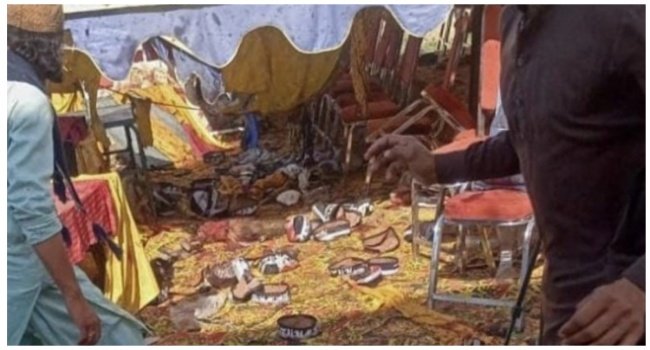
At least 39 people were killed and dozens more wounded Sunday by a bomb blast at a political gathering of a radical Islamic party in northwest Pakistan, officials said.
The blast targeted the Jamiat Ulema-e-Islam-F (JUI-F) party when more than 400 members and supporters gathered under a tent in the town of Khar, near the border with Afghanistan.
“I can confirm that in the hospital we have 39 dead bodies, with 123 wounded that includes 17 patients in a serious condition,” Riaz Anwar, the health minister for Khyber Pakhtunkhwa province, told AFP.
Provincial governor Haji Ghulam Ali confirmed the death toll to AFP.
Images from the blast site circulating on social media showed bodies strewn around the scene, and volunteers helping blood-soaked victims to ambulances.
No group has claimed responsibility for the attack, but the local chapter of the Islamic State (IS) group has recently carried out attacks against JUI-F.
Last year, IS said it was behind violent attacks against religious scholars affiliated with the party, which has a huge network of mosques and madrassas in the north and west of the country.
The jihadist group accuses JUI-F of hypocrisy for being a religious Islamic group that has supported successive governments and the military.
Pakistan has seen a sharp rise in attacks since the Afghan Taliban surged back to power in neighbouring Afghanistan in 2021.
Pakistan’s home-grown Taliban group, the Tehreek–e-Taliban Pakistan, has directed its campaign against security officials, including police officers.
In January, a suicide bomber linked to Pakistan’s Taliban blew himself up in a mosque inside a police compound in the northwestern city of Peshawar, killing more than 80 officers.
The militant assaults have been focused on regions abutting Afghanistan, and Islamabad alleges some are being planned on Afghan soil — a charge Kabul denies.
Bajaur is one of seven remote districts bordering Afghanistan in a region that was once a focal point in the global war on terror.
Pakistan was once plagued by almost daily bombings, but a major military clearance operation which started in 2014 largely restored order.
Security has since improved with the northwest brought under the control of Pakistani authorities after the passage of legislation in 2018.
Analysts say militants in the former tribal areas adjacent to Peshawar and bordering Afghanistan have become emboldened since the return of the Afghan Taliban.
Pakistan’s government is due to dissolve in the next few weeks ahead of elections expected in October or November and political parties are preparing to campaign.




